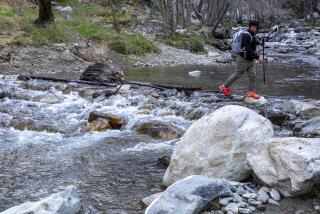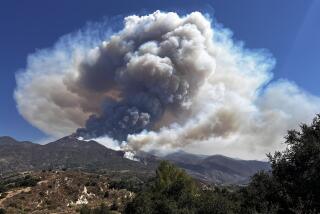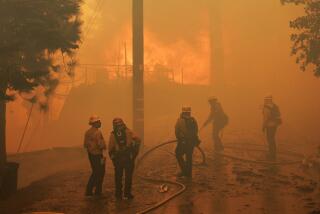Excess Brush Fed Flames
A brush fire that burned five condominiums along a coastal canyon proved so destructive in part because some residents failed to clear vegetation around their homes, fire officials said Thursday.
Coastal sage and other native vegetation known to be highly combustible weave their way through many backyards along the canyon’s ridge, in some cases growing far too close to foundations, officials said.
Under the county’s Uniform Fire Code, owners and renters in hillside areas must leave 30 to 100 feet of “defensible space” for firefighters to work within. But Battalion Chief Scott Brown said some residents didn’t have the required buffer zone.
“It was one of the contributors to the rapid fire spread,” Brown said.
Flames raced up the canyon Wednesday afternoon, forcing residents to evacuate and requiring the efforts of more than 100 firefighters. Although no one was injured, the fire destroyed a three-unit condominium complex valued at nearly $1 million as well as two units in a neighboring structure. A house on the other side of the canyon also was seriously damaged.
Investigators are searching for two or three teenagers who were seen running from the area near the beach where the fire broke out. Arson investigators interviewed witnesses and pursued various leads but no one was in custody by late Thursday, Brown said. A source close to the investigation said officials have identified suspects and expect to make arrests soon.
The Orange County Fire Authority is responsible for making sure homes in San Clemente meet building and fire standards. But inspectors do not investigate older neighborhoods unless there is a complaint.
“It would be unrealistic to think that we would be inspecting each and every canyon,” Brown said. “There are thousands of them. It would be impossible for us to do that.”
Officials couldn’t say whether any complaints had recently been filed in the area around Trafalgar Canyon. A cursory search of the Fire Authority databases found 12 fire hazard complaints for all South County cities in 2000. Brown said some were from San Clemente but “none that I’m aware of from that area.”
In the wake of the fire, many residents said they will immediately clear brush around their homes, which are nestled in a horseshoe shape around the ridge of the canyon.
“Nobody has ever cleared the brush from their places, but it should be done, and I think we’re going to do it from now on,” said Kay Owens, whose condo was condemned because of severe damage.
City Councilman G. Wayne Eggleston, who lives a few doors from Owens, said the fire is a wake-up call in an area where residents have been complacent about the risks.
“We all have to be very diligent now,” he said.
Jerry Koger, president of the Driftwood Bluffs Condo Assn., said his board plans to plant fire-resistant trees and shrubs. “We will become more aggressive,” he said.
Some residents said the homeowners’ association had talked in the past about planting fire-resistant vegetation around the canyon but had been told that the California Coastal Commission doesn’t allow nonnative plants.
Officials from the commission said they would never thwart efforts to clear buffer zones. But they said their goal is to keep the canyons themselves flourishing with native plants.
The fire broke out just after 3 p.m. near Calle Conchita and Esplanade in an upscale neighborhood overlooking the San Clemente Pier. Although fire officials urged residents to evacuate, many stayed behind to protect their homes with garden hoses.
The dense vegetation near homes was only one factor in the fast pace of the fire. The condos were built in 1980 and had wood shingles that would not be allowed under today’s fire codes.
Residents spent Thursday sifting through what remained of their homes.
Kay and Jack Owens pulled out a large blackened porcelain figurine and other damaged knickknacks in hopes of restoring them. Kay tried to look on the bright side. As she dabbed at tears behind her sunglasses, she said she felt worse for her neighbors, who lost everything.
Christine Yost, 49, had lived in the canyon for a year with her husband and hoped to eventually purchase the unit they had rented.
“It took us 29 years to get here, and now we got to start over at [age] 50,” she said.
Yost, who does not have renters’ insurance, said she’s not sure what she will do.
“This was going to be our retirement home,” she said. “This was going to be our last place.”
Some residents continued to complain that it took firefighters more than 20 minutes to get to their side of the canyon.
“If they had gone to the right address, there would not have been a disaster, period,” said Tony Wood, 61, whose home was gutted. Wood said he cleared vegetation last month, so he doesn’t think it was factor with his home.
But fire officials maintain they handled the response properly. The first engines were called to the mouth of the canyon, where the fire was initially reported. They arrived within eight minutes of the first call.
At that point, the flames were racing up the canyon toward the homes that were eventually damaged. Fire crews were then redeployed up the canyon, arriving within 18 minutes of the first call, officials said. The engines were slowed by curious motorists who pulled over on the narrow canyon streets to watch the fire.
Officials said one of their biggest challenges is educating residents who live so close to undeveloped patches of land about the importance of maintaining fire breaks, and identifying and reporting anyone who is not doing so.
“Our defendable space is critical when you have a fire in those areas,” Brown said. “We rely on the homeowners to contact us and bring those types of things to our attention.”
(BEGIN TEXT OF INFOBOX / INFOGRAPHIC)
Safety vs. Environment
Fire officials said some residents who live along a canyon that burned Wednesday did not properly clear brush from around their homes. Residents, however, said they wanted to plant fire-resistant plants such as ice plant around their homes but were told that California Coastal Commission regulations only allow for native vegetation in the canyon.
Source: San Clemente Planning Department
Graphics reporting by BRADY MacDONALD / Los Angeles Times
More to Read
Sign up for Essential California
The most important California stories and recommendations in your inbox every morning.
You may occasionally receive promotional content from the Los Angeles Times.










